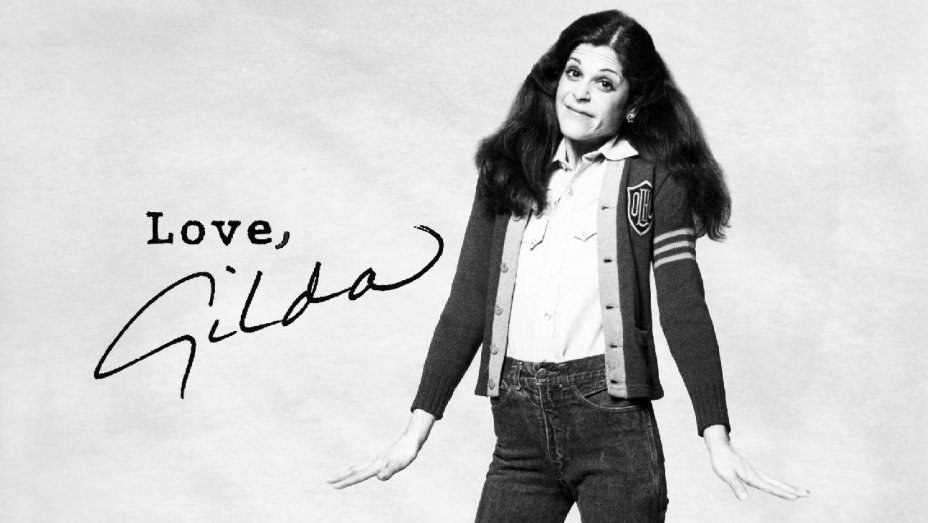
Love, Gilda is a beautiful love letter to an iconic comedienne
Written by: Lauren Humphries-Brooks, CC2K Staff Writer
Most viewers know Gilda Radner from her stint as one of the few women on the first iteration of Saturday Night Live, where her characters Roseanne Roseannadanna, Emily Litella, and her (still very funny) mockery of Barbara Walters made her a comedic icon. A manically funny performer, she’s set against the deadpan Chevy Chase or the equally wild John Belushi, but there are times when she comes off as a woman in a man’s world, struggling to stretch herself in the face of low-key sexism.
Radner was one of the most prolific members of the cast, a writer and comedienne who seemed most in her element when playing a character, less in playing herself. She’s the subject of a new documentary Love, Gilda, a loving ode to the performer, her life, her struggles, and her comic legacy.
Love, Gilda makes copious use of recordings and journal entries Radner left behind, allowing director Lisa D’Apolito the opportunity to tell Radner’s story in her own words. There are also the usual talking head interviews and archival footage, depicting Radner’s upbringing, her adoration of her father, her eventual move to Toronto and work with Second City, and then to New York and the Not Quite Ready For Primetime Players, which eventually morphed into Saturday Night Live.
The film sets her life and comedy within the context of the 1960s and ’70s, reminding viewers of the cultural and political landscape in which SNL was born. Because there’s so much reliance on Radner’s words and personal reflections, Love, Gilda feels both intimate and, at times, more uncomfortable than similar documentaries. This is Gilda in how she perceives herself and her struggles – with weight, with relationships, and finally with the cancer that would eventually take her life – and how she wants to be remembered.
Love, Gilda goes in depth with some of the most personal issues in Radner’s life, depicting her comedy as a way of coping with her own lack of confidence, struggles with bulimia, and the casual sexism she faced from fellow SNL writers and cast members. There’s a hint of pop psychology at the film’s base, but it’s really about what she saw as her problems, not the way others saw her. One of the undercurrents of Radner’s life seems to be the sexism of the men with whom she worked – and with whom she had relationships – and their unwillingness to give her and the other women of SNL the flexibility and credit as writers and performers, welcoming adulation and laughter, but balking when Radner got the laughs for herself.
And she was very funny – Radner was one of the founding members and shapers of the SNL legacy, overshadowed by men who didn’t want to play second fiddle to an often much-funnier woman. Love, Gilda doesn’t want to criticize too much, and skirts over some issues — like Radner’s complicated relationships with Bill Murray and John Belushi – while giving more attention to issues like her bulimia and weight problems. But this is a love letter, not an expose, and might be forgiven for not dwelling too long on the bad behavior of the men around Gilda.
Love, Gilda also stretches beyond Radner’s immediate cultural impact into her legacy – interviews with current and former SNL cast members, including Amy Poehler and Tina Fey make a strong case for Radner as a pioneering comedienne who broke through sexist molds simply by being unabashedly funny. The downside to this is the film makes only scant use of clips from Radner’s SNL appearances and one-woman show, truncating clips into sound bites that would be better served by being shown in full. While there’s no reason to turn a documentary into a clip show, having at least a few of the SNL skits in full would contribute to the underlying argument that Radner is as great a name in comedy as Bill Murray or John Belushi.
Anyone who knows Radner’s story knows how this ends, though. Her death of ovarian cancer at the age of 42 cut off a life that was already so full, so legendary, it makes one wonder what else she might have done as a performer, a writer, a comedienne. The film gives her relationship with Gene Wilder loving attention, and it’s here that Love, Gilda grows increasingly melancholy, turning to home movies and interviews produced during her illness. But like Radner herself, the film does not leave us in tears, mourning a life unfulfilled, but makes much of her contributions to comedy, her lasting effect on American culture and, just as importantly, on the people who knew and loved her.
Love, Gilda is a wonderfully intimate and generous film, a love letter to a woman whose persona and comedy made the world a little lighter. It also proves that, nearly thirty years after her death, Gilda Radner still makes us laugh.
Love, Gilda is in select theaters this Friday
